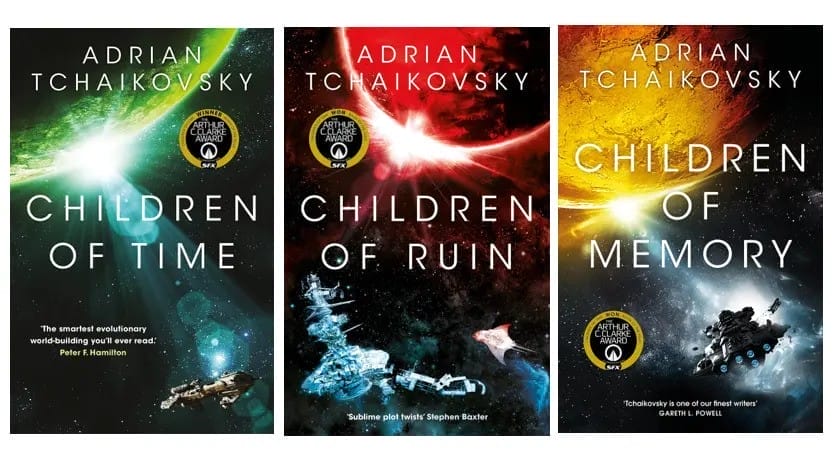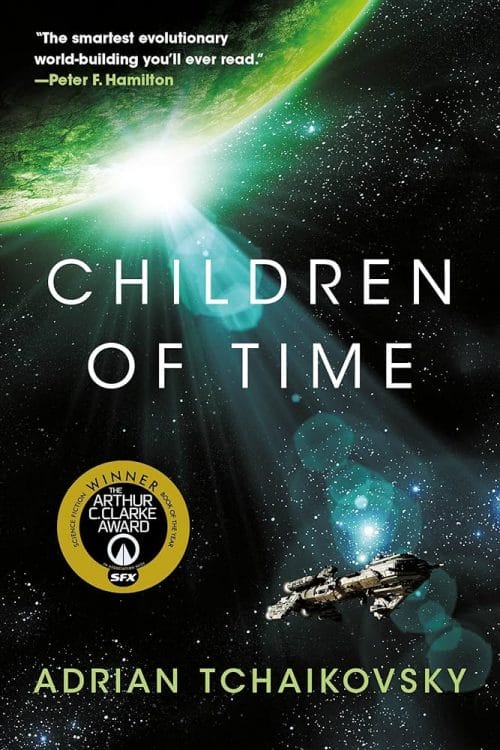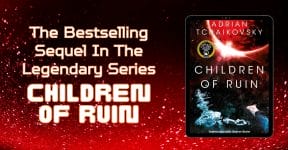In the vast expanse of science fiction literature, some works transcend the boundaries of imagination. Ready for a fresh take on a time-honored genre? Adrian Tchaikovsky’s Children of Time stands as a shining example of brilliance, weaving a tale that stretches across galaxies. We can explore themes of evolution, civilization, and the eternal dance between progress and destruction. In this article, we embark on a journey through the pages of this captivating novel, delving into its intricacies, its profound insights, and its lasting impact on the genre. Join us as we uncover the secrets of Children of Time and discover why it continues to resonate with readers long after they’ve turned the final page.
Table of Contents [CLICK HERE TO OPEN]
Children of Time Series
Adrian Tchaikovksy’s award-winning novel Children of Time, is the epic story of humanity’s battle for survival on a terraformed planet.
The last remnants of the human race left a dying Earth, desperate to find a new home among the stars. Following in the footsteps of their ancestors, they discover the greatest treasure of the past age — a world terraformed and prepared for human life.

The series is highly regarded in the Sci-Fi world, with thousands of fans across the world. In 2023 the series received the Hugo Award for Best Series. The books in the series are as follows:
- Children of Time – 2015
- Children of Ruin – 2019
- Children of Memory – 2022
Children of Time – Adrian Tchaikovsky

Adrian Tchaikovsky’s award-winning novel Children of Time, is the epic story of humanity’s battle for survival on a terraformed planet.
Who will inherit this new Earth?
The last remnants of the human race left a dying Earth, desperate to find a new home among the stars. Following in the footsteps of their ancestors, they discover the greatest treasure of the past age—a world terraformed and prepared for human life.
But all is not right in this new Eden. In the long years since the planet was abandoned, the work of its architects has borne disastrous fruit. The planet is not waiting for them, pristine and unoccupied. New masters have turned it from a refuge into mankind’s worst nightmare.
Now two civilizations are on a collision course, both testing the boundaries of what they will do to survive. As the fate of humanity hangs in the balance, who are the true heirs of this new Earth?
Our Overview
We follow Kern’s ambitious plan to terraform a planet and accelerate the evolution of primates using a virus. However, her scheme is foiled by Sering, a member of a rebellion, who destroys the ships carrying the monkeys. Forced into hibernation in an escape pod, Kern awaits rescue as her plan takes an unexpected turn.
Meanwhile, the virus succeeds in its intended purpose, albeit on invertebrates rather than primates, setting the stage for the emergence of intelligent life in the form of Portia, a remarkable jumping spider poised to lead her species toward sentience. As Holsten Mason awakens from cryo on the Gilgamesh, the crew intercepts a distress signal, leading them on a perilous journey back to Kern’s World.
Upon reaching the planet, the crew encounters hostility from an evolved species they initially mistake for simple spiders. Tensions escalate as they attempt to communicate, triggering a series of events that culminate in a struggle for survival against both internal and external threats.
As the narrative unfolds, themes of identity, cooperation, and the inevitability of change come to the forefront. Characters like Fabian advocate for equality among the spiders, while others grapple with the consequences of their actions and the nature of humanity itself.
Our Review
Despite its length, Children of Time captivates readers with its expertly paced narrative, deftly balancing highs and lows. The detailed portrayal of the spiders’ evolving society, albeit unexpectedly sexist, offers a fresh perspective on community dynamics. The novel’s brisk chapter lengths force you to just keep going. The final 100 pages are amazingly faced-paced and particularly enthralling, featuring a gripping space battle and an unpredictable conclusion…
Not a huge Sci-Fi fan? Worry not! Children of Time doesn’t go too heavy on the Science jargon; the focus is on the characters, story, and development. Prepare to have your heartstrings pulled! If you’ve never cried over a revolutionary hero spider, this is your chance.
Whilst carrying the appearance of a typical Sci-Fi book, Tchaikovsky has broken the mold with this series. It’s reminiscent of the long-lived genre of Sci-Fi but provides an intriguing, fresh twist.
Frequently Asked Questions
Is Children of Time part of a trilogy?
It is – check out the rest in the series:
- The Children of Time – 2015
- Children of Ruin – 2019
- Children of Memory – 2022
Can you read Children of Time as a stand-alone novel?
You could finish the series with Children of Time, however you would meet the final pages with some unanswered questions. Undoubtedly if you get that far, you won’t be able to help yourself!
How does Children of Time end?
The surprise resolution of Children of Time saw the war between the humans and the spiders end with the infection of the desperate and barbarous human remnant with the uplift virus, an event which altered their thinking enough to allow them to see the wisdom of peace.
Is Children of Time about spiders?
The book follows alternate perspectives, one being a new generation of spiders. Arachnophobes might need to pace themselves through this novel!
Why not check out some Time-Travel Sci Fi books?






